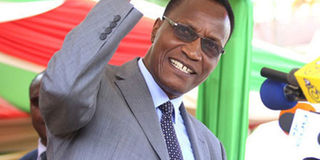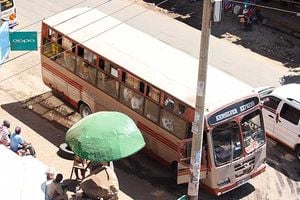Sh11bn released for free learning

Education Cabinet Secretary Jacob Kaimenyi. A total of Sh11.2 billion for free primary and day secondary school education has been released. FILE PHOTO | NATION MEDIA GROUP
What you need to know:
- Education Principal Secretary Belio Kipsang on Wednesday said Sh3.2 billion will be used to pay for free primary education while Sh8 billion is for subsidised secondary education.
- Releasing the money is a big relief for schools, which have been struggling to pay suppliers and non-teaching stuff.
A total of Sh11.2 billion for free primary and day secondary schools education has been released.
Education Principal Secretary Belio Kipsang Wednesday said Sh3.2 billion will be used to pay for free primary education while Sh8 billion is for subsidised secondary education.
Dr Kipsang said only about Sh3 billion had been released to schools by Friday last week.
“Schools can now check their accounts as we have released the whole amount,” said the PS.
The government has been facing financial problems, which caused a delay in paying civil servants’ salaries countrywide.
It released the money in tranches — 50 per cent first term, 30 per cent for second term, and the balance in third term.
This financial year, Sh14.5 billion was allocated for free primary education and Sh32 billion for subsidised secondary education.
Releasing the money is a big relief for schools, which have been struggling to pay suppliers and non-teaching staff.
RIGHT TO FREEWILL
Earlier on Wednesday, Kenya Secondary Schools Heads Association chairman John Awiti claimed that the science practicals examinations could be paralysed unless the cash was released.
Meanwhile, Education Cabinet Secretary Jacob Kaimenyi on Wednesday warned university heads to stop meddling in students’ elections.
Prof Kaimenyi claimed that interference was the main cause of student unrest during campaigns at universities.
Referring to the riots at Maseno University on Tuesday, in which two students died, Prof Kaimenyi said it could easily have been prevented.
“That was very sad. The main cause of these unnecessary disputes are senior administrative officers, especially the vice-chancellors, who usually front their preferred candidates in the elections, against those supported by most students,” said Prof Kaimenyi.
“The main purpose of these elections is to have leaders who will act as a bridge between them and the administration. Therefore, they should be allowed to exercise their right to free will,” said Prof Kaimenyi.





